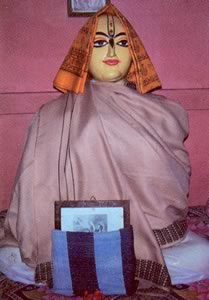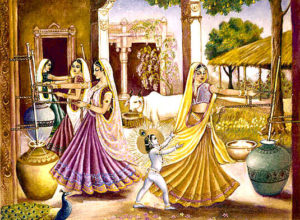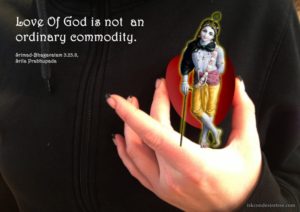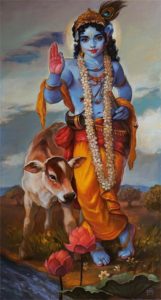
Hare Krishna Dear devotees,
We often read and hear, how being a devotee, our heart should be soft, full of humility and compassion for others. Sometime we are not even sure where to draw the final line as there are different instructions for devotees at different levels of consciousness. We do not even know what is true humility and many a times wonder how a pure Vaishnava thinks, what are his emotions and how does he acts?
Caitanya Mahaprabhu quoted the below verse, from Mahabharat, to a brahmana during his visit to Mathura
tarko ’pratiṣṭhaḥ śrutayo vibhinnā
nāsāv ṛṣir yasya mataṁ na bhinnam
dharmasya tattvaṁ nihitaṁ guhāyāṁ
mahājano yena gataḥ sa panthāḥ
‘Dry arguments are inconclusive. A great personality whose opinion does not differ from others is not considered a great sage. Simply by studying the Vedas, which are variegated, one cannot come to the right path by which religious principles are understood. The solid truth of religious principles is hidden in the heart of an unadulterated, self-realized person. Consequently, as the śāstras confirm, one should accept whatever progressive path the mahājanas advocate.’
(CC Madhya 17.186)
There have been innumerable great devotees whose example we can take, Srimad Bhagavatam also mentions names of 12 mahajans. So which mahajan should we look up to?
Interestingly, Srila Bhaktivinoda Thakura has stated that for us, Gaudia Vaishnava , the followers of Mahaprabhu are the modern mahajans. We should follow them. He writes :
The åñis and mahätmäs who have taught conduct before the appearance of Sri Caitanya Mahaprabhu are counted among the previous mahäjanas. The conduct seen in the mahäjanas after the appearance of Sri Caitanya Mahaprabhu is the conduct of later mahäjanas. The conduct of the later mahäjanas is superior and should be adopted. The conduct of Sri Caitanya Mahaprabhu and His followers is meant to teach people, so that conduct should be followed in all respects.
So let us hear about the thinking, feeling and acting of one of such mahajans, Srila Haridas Thakur, whom Caitanya Mahaprabhu declared to be Namacharya of our sampradaya. So he is definitely qualified to be one of modern mahajans. Let us find about the condition of his heart from Caitanya Bhagavat, may be we feel inspired to have a re-look at our own heart.
Background
Srila Haridas Thakur was born in a muslim family in a village called Buron, and because of his presence there, many people became purified and took up the chanting of the holy name. After some years he left his village and travelled to a place near the river Ganga. He finally settled in the village of Phulia near Santipura.
He passed his time wandering on the banks of the Ganga chanting the name of the Supreme Lord Krishna. It was common to see him dancing while he sang the glories of Lord Krishna’s name. People would gather around him just to see the unrestricted tears of love of Godhead that flowed profusely from his eyes, drenching his entire body. Even the strictest atheists marvelled at his behaviour.
The Circumstances
The local Qazi became envious of Haridas Thakur’s popularity and reported to the Nawab, “This man is acting like a Hindu; arrest him and punish him appropriately.” Thus Haridas Thakura was arrested.
In the court he was accused of practicing Hindu religion despite being a muslim. When Srila Haridas Thakur replied that God is one and the difference between Hindu God and Muslim God is in Name only, he was sentenced by the Nawab to be lashed in 22 market places until he dies.
He was then dragged by the soldiers from one market place to another, lashing him mercilessly. By the grace of Lord Krishna, Haridasa felt little pain in his body. Just like Prahlada in the Srimad Bhagavatam who was tortured by demons, Haridas never suffered at all. Not only was Haridas freed from his pain, whoever remembers this story of Srila Haridas will also be saved from the miseries of life. Throughout his ordeal, Haridasa’s one emotion was pity for the sentries. “O Lord Krishna, please be merciful upon these poor souls so they may not be punished because of me.”
(What would be our reaction if someone were to give us a humiliating public chastisement, or God forbid, a tight slap, for no fault of ours?)
What Krishna will not do for His pure devotee !
During Caitanya Mahaprabhu’s mahaprakash pastime, He called for Haridas Thakur and shared that when Haridas Thakur was being beaten how Lord wanted to kill all the soldiers but He could not do so because Haridas Thakur himself was praying for those very soldiers!
Sri Caitanya Mahaprabhu revealed:
I hesitated in My heart to punish them for it will disturb you, knowing your compassionate nature.
My Sudarsan disc weapon was rendered impotent. I could not strike those men because you were determined to forgive them and so unable to see your misery I protected you from their lashes by placing My back on your back.
“I accepted all those lashes meant for you on My back, see the marks on my back.
Haridas Thakur’s glorification of Mahaprabhu
When Haridas heard about the Lord’s magnanimous deed he fell swooning to the ground. He lost all external consciousness and was immersed in an ocean of ecstasy.
Thakura Haridas said, “O Lord Visvambhara! You are the Lord and Protector of the Universe, now the responsibility of delivering a lowly fallen wretch like me rests on You, My Lord. How can I describe Your transcendental glories as I do not possess any good qualifications, I am sinful, and I am not even within the Vedic society.
(We all have many demoniac propensities but how do we see ourselves in the mirror every day?)
Just seeing me makes a person vulnerable to sin, and touching me makes one so contaminated that he must bath immediately; how can I say anything about Your divine pastimes?
(Whereas our mere touch or at least our power of speech is capable to turn any non-devotee into a devotee, God’s gift to mankind, only if others were to follow my instructions, or better, hear my pastimes!)
There is one fact that You yourself have stated, anyone remembering your lotus feet, be he an insignificant and fallen as an insect, is never forsaken by You. Whereas even a mighty king falls from grace if he disregards Your lotus feet. I am incapable of remembering You although I know you shelter the most impoverished soul if he simply remembers You.
(Remember Haridas Thakur would daily chant 300,000 names or 192 rounds every day. What most of us chant in 12 days!)
The evil Duryodhana and Suhsasana dragged the righteous Draupadi into the palace court wanting to disrobe her. Confronted with the danger of disgrace she remembered You, Krishna. And because of this You made her sari endlessly long by Your mystic potency. Yet the evil doers could not perceive Your hand in this.
I am so sinful that I cannot remember such a magnanimous Personality as You; O Lord! please therefore give me shelter at Your lotus feet.
The demon Hiranyakasipu inflicted all varieties of treachery and brutal methods trying to kill Prahlad like poisoning, hurling down from the mountain, throwing in boiling cauldron of oil etc. Yet throughout his tribulations Prahlad meditated upon Your lotus feet and was saved from each and every calmity. In this way You humbled many of his enemies and took away all their vitality and strength: finally You appeared in Person due to Prahlad’s meditation.
Once the five Pandavas were in grave dilemma fearing the wrath of Durvasa Muni, but by remembering You, You appeared personally and saved them. You calmed Yudhisthira Maharaja with your assuring words, see I am already here, you just sit down and relax and I will take care of Durvasa Muni and his army of disciples.”
Only the shred of vegetable left stuck to the side of the pot after the Pandavas had eaten was taken by; Lord Krishna relishing the thought of coming to His devotees aid. The sage with his disciples meanwhile bathing in the river suddenly felt full in the belly like having eaten a sumptuous meal” ashamed and tearful they fled.
The miraculous benefits of remembering Your lotus feet was amply demonstrated by the Pandavas in this incident. The path of true devotion for everyone is to remember You; You perform Your super excellent activities to rescue Your devotees.
(My own pastimes spontaneously start floating in my mind when I am chanting, for some strange reason happenings in my own life seems to be more interesting then Krishna’s pastimes)
“O Lord! I am such a destitute that I do not even possess the sweetness of Your memory and yet You have not forsaken me. Although I am unfit to see You, You are present before me in person. I am praying to You now for only one benediction.”
(Why is Krishna taking so much time to reciprocate? I am almost ready to join the boys!)
Lord Chaitanya replied, “Say all that you want to say, there is nothing that I do not want to give you.“
Haridas spoke to the Lord with folded hands, “O Lord, I have known only misfortune yet You give me so much hope. Just allow me to partake of the remnant of foodstuffs of Your devotees totally surrendered to Your lotus feet. Let this activity be my permanent and most prominent service life after life. My sinful birth and existence is miserable, without remembering You, but now please make my life successful by granting me the remnant of Your servitors.
(What! Not to become a gopi? Not even a gopa or even a simple servant of Krishna. We can close our eyes and consider what will be our reply if Krishna decides to manifest in front of us and says ‘Ask Me anything you may desire’)
I feel within my heart that I have committed a grave offense by asking of You to situate a elevated status of that of a Vaishnava, although I am grossly unfit.
( He is considering it an offense that he even asked or desired to come to the level of a Vaishnava!)
O Lord! my master, Protector and the maintainer of the entire creation, I am spiritually lifeless, therefore kindly forgive my ignorance.
(After joining ISKCON I have gathered so much information!)
O Lord Visvambhara, the beautiful son of Mother Saci, You are my master, so be merciful to me and keep me as a dog in the house of a Vaishnava.”
( Not even a cow ! who is at least tied within the boundary of the home. A dog is not even allowed inside a cultured Vaishnava’s home)
Haridas Thakur was overwhelmed by feeling of ecstatic devotional emotions and he repeatedly petitioned the Lord, his desire for humility and devotional service unfulfilled.
( We are feeling morose simply by reading what all is Haridas Thakur requesting from Mahaprabhu!)
Caitanya Mahaprabhu reveals His heart
Lord Chaitanya replied, “Listen My dear Haridas, you are a highly elevated Vaishnava, if anyone spends a day in your services and association or you kindly speak to someone for a short time, that person certainly achieves Me, there is no doubt about this. Whoever respects and serves you does so to Me also, for I perpetually reside within you.
As my servitor Your position is unique, you have therefore imprisoned Me within your heart eternally. I bless you that since you are crowned already with a faultless character that you will always continue to worship and serve Me and My devotees without a single deviation or offense.”
A tumultuous sound of joy from the Vaishnavas greeted Lord Chaitanya’s boon to Haridas Thakur. High birth, caste, fruitive activities or wealth are worthless commodities to achieve love of Godhead only the intense loving desire for Krishna can bring one to the lotus feet of Krishna.
Where do I go from here, I definitely have a long way to go!
In the spiritual matters there is no loss or anything disheartening everything has a positive outcome. Please rejoice as we read below the benediction of just hearing the above chapter from Caitanya Bhagavat, Madhya Lila, chapter 10.
One who hears this pastime of the Lord and Haridas Thakur with proper faith will certainly enjoy the fruit of Lord Krishna prema. These words are not my concoction but the bold declarations of all scriptures. One is sure to experience the bliss of devotional service to Lord Krishna if one hears the transcendental activities of the pure devotees of the Supreme Lord. All glories to Haridas Thakur, a giant amongst the Vaishnavas, remembering him one is freed from all sinful reactions.
Where to read: ISKCONDESIRETREE E BOOK
Where to hear : Audio book format in Android mobile app
Now it is upon us to see whether we even have a desire to enjoy the fruit of Krishna prema or not!
All glories to heart of a Vaishnava.
All glories to Srila Haridas Thakur.
All glories to Sri Guru and Gauranga.
All glories to Srila Prabhupada.
Your servant,
Giriraj dasa
Like this:
Like Loading...












